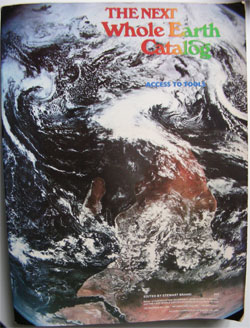Dampfbrowser
 Auf dem Flohmarkt habe ich kürzlich ein 600 Seiten dickes grossformatiges Buch erstanden: The Next Whole Earth Catalog heisst es, erschienen ist es 1980, eine zweite Auflage erschien 1981. Es ist randvoll mit Hinweisen, Adressen, Buchtips und unscharfen Schwarzweissbildern zu Themengruppen wie: Understanding Whole Systems, Land Use, Soft Technology, Craft, Community, Politics, und Communications.
Auf dem Flohmarkt habe ich kürzlich ein 600 Seiten dickes grossformatiges Buch erstanden: The Next Whole Earth Catalog heisst es, erschienen ist es 1980, eine zweite Auflage erschien 1981. Es ist randvoll mit Hinweisen, Adressen, Buchtips und unscharfen Schwarzweissbildern zu Themengruppen wie: Understanding Whole Systems, Land Use, Soft Technology, Craft, Community, Politics, und Communications. Die ideologische Ausrichtung ist ökologisch und individualistisch: Regierungen, big business, das Schulsystem und die Kirchen hätten versagt: "In response to this dilemma a realm of intimate, personal power is developing - the power of individuals to conduct their own education, find their own inspiration, shape their own environment, and share the adventure with whoever is interestet. Tools to aid that process are sought and promoted by The Next Whole Earth Catalog."
Diese Kataloge sind zwischen 1968 und 1972 regelmässig erschienen, danach nur noch in Abständen. In den 1980er Jahren wandelte sich der Katalog zu einem Magazin Whole Earth, mit einer letzten Ausgabe 2003.
In den ersten vier Jahren war der Whole Earth Catalog so etwas wie die Bibel der ökologischen Bewegung und erhielt sogar einen National Book Award, eine grosse Ehre für einen Warenkatalog.
"Standing with one foot firmly in the rugged individualism and back-to-the-land movements of the Sixties counterculture and the other in the nascent global community made possible by the Internet, the WHOLE EARTH CATALOG offered an integrated, complex, challenging, thought-provoking, and comprehensive worldview," heisst es auf der Website des Whole Earth Catalogs
Steve Job, der Gründer von Apple und Pixar, war auch einer dieser "rugged individuals", er sagte 2005 in seiner Rede vor den Studenten von Stanford University unter anderem:
"When I was young, there was an amazing publication called The Whole Earth Catalog, which was one of the bibles of my generation. It was created by a fellow named Stewart Brand not far from here in Menlo Park, and he brought it to life with his poetic touch. This was in the late 1960's, before personal computers and desktop publishing, so it was all made with typewriters, scissors, and polaroid cameras. It was sort of like Google in paperback form, 35 years before Google came along: it was idealistic, and overflowing with neat tools and great notions."
Die inhaltliche Fülle des Katalogs ist wirklich erstaunlich gleichzeitig erlaubt es einen Einblick in die Kultur der frühen 80er Jahre, eine Zeit, in der Atari 800 und Apple II als state of the art galten.
Back issues von Whole Earth kann man hier anschauen.
waltraut - Donnerstag, 5. August 2010, 09:25
